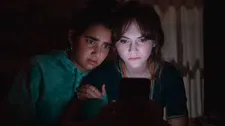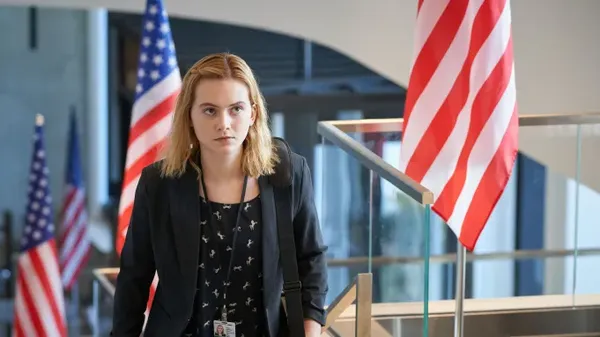Reality Winner might sound like a description of the latest Big Brother finale but it’s the genuine name of a US whistleblower who, while working as a National Security Agency leaked a document showing Russian interference in the 2016 elections. She is played by Emilia Jones, who is reteaming with director Susanna Fogel after last year’s Cat Person. Rather than the usual shadowy dramas, along the lines of Official Secrets, Fogel, working from a script from Kerry Howley, instead presents the action through a brightly coloured lens. The scoring, too, from Heather McIntosh - who is also reteaming with Fogel after Cat Person - has a brisk pop-inflected feel. We caught up with the composer - whose pre-film scoring collaborators include Gnarls Berkley and Lil Wayne - to talk about working with Fogel again, her approach to this film and her hopes for the future.
You first worked with Susanna Fogel on Cat Person, this seems to be a fruitful collaboration, can you tell me a bit about that.
Heather McIntosh: Oh, it's amazing. I feel like working on Cat Person together, we really developed a shorthand. Whenever you work with a director, you find your own way. And we had a lot of time on that film to explore. It was so exciting, exploring the grey area. You don't want to push the audience too far, one way or the other. We really learned what the score needed and, and our communication just got stronger and stronger as we went through. So when we started this project, it was just a breeze. We had very little time, and we just dove in immediately and picked up from where we left off. We already learned our language so now we can just get there so much more quickly.
It’s quite unusual because when someone talks about doing a whistleblower film, your immediate thought is not this sunnyside up style.
HM: A jaunty situation! A teen movie almost. I was so refreshed by it when I saw the cut. And I just love the idea of like, you see the headlines, and people are so quick to think like, ‘Oh, whistleblower, like, that's what that needs to be, it needs to be heavy or you have such an idea of who Reality Winner as a person is, or what she has just by your headlines’. But we’re fully realised people, she's a funny person. So you want to fold that in along with the major risks she took to follow her path and her desire for justice. And it's fascinating to see where that came from. And that starts as a nine-year-old kid.
When they told you about it, were we expecting something different to what you actually saw?
HM: I feel like I knew a little bit about the tone before I went in. But I found it when I watched the cut. I just knew Susanna was connected with it and I was excited about that. And, you know, it had the same star and so to have Emilia in it as well, I just knew I was ready to jump. We're exploring her obsessive nature and it does cover a pretty big range, the OCD that Reality’s navigating, her time in prison. It does sort of ride this wave, very anxietal stuff but also up.
Did I hear marimba in the score, you don’t get that so often?
HM: There’s a lot of marimba, a lot of vibes (vibraphone). We did have a couple other references. There's some fun things I got to do. I got to turn to something that might have originally been source into score, because none of the source music that they were choosing was exactly perfect, or was impossible to get. So it's great to be able to lean into my more pop sensibility. I’ve played in a ton of pop bands, and then also done orchestral work so it's like fun to really figure out how I can create throughlines between the poppy stuff when she's walking home from school, and the Air Force recruiter is bugging her. Can I lean into this almost no-wavey sort of space. But how to make those throughlines. I can take this little theme from over here, this poppy version into like this big epic, orchestral move on low brass at the end. It's great to really tie it together. The joy of having a composer on a project that, all of a sudden, everything just lives together.
Having come from a live performance background, how is it to be doing this stuff that’s on your own without crowd feedback.
HM: It's a blast. I mean, I love working on studio records. I still occasionally play the cello on people's stuff. But it was really fun. I was like, ‘Ooh, I get to like, write funky stuff, like, the opening credits and all these things that like, they could have chosen some needle drop’. One of my favourite movies is Robert Altman’s The Long Goodbye. And the way you get to do your piped in music version of the song when he's grabbing his Courry brand cat food, to the yoga, ladies in the back. To be able to find those threads and let them live through the score in different ways. Here's our pop version of her.
Is there any sort of score that you would like to have a go at?
HM: I would love to do a dark sci-fi. I use a lot of orchestral instruments and I have worked with an orchestra before, but I feel like the next frontier for me this year is I really want a live orchestra with players in the room. It’s just the most thrilling thing. I also just love bad guys. So like, sign me up. Like The Shining, all the great avant garde music that lives in a score like that, where you have, like Penderecki and Bartok.I’d like to sort of lean into that space in a horror sci-fi would be so fun.
Do you like it when something is a little bit different? That you don’t want to go over the same thing.
HM: Of course, you love it when someone comes to you about your sound, and they're like, ‘We love what you did in compliance back in 2012, or whatever’. That still happens, we, I have moments where someone sees something I've done, and they're like, ‘We're doing something that tonally makes sense. I love that. But I also really love stretching.To get to tell different stories is hopefully why we're all here. And the joy of composing is that you can stretch and try new things and pull out new instruments.
This time you have a collaboration but a lot of the time you won’t have that. How is the difference, does it take a lot longer to get on the same wavelength?
 |
| Heather McIntosh also scored Cat Person. 'It was so exciting, exploring the grey area. You don't want to push the audience too far, one way or the other' Photo: Courtesy of Sundance Institute |
HM:To a certain extent, but I’m such a cinema buff. I come from the video store employee world. When I was in high school, I snuck on the other side of town to go to the arthouse cinema to go see Todd Haynes’ Poison at 16 - it broke my brain. Of course, I love second and third collaborations, and I have people that I've worked with more than once for sure, like Susanna or Craig Zobel or Riley Stearns, who I've worked with a couple times. So I have a couple places where it's like, ‘Ah, let's get back on the bus again. Let's go on tour.’ but I just love finding new opportunities to communicate about stories with new people to you know,
They must love you because you’ve already got the film knowledge?
HM: I think also because of my video background, I am a researcher first. When I start a project, especially with a new filmmaker, I want to get as close to their shorthand as I can from the beginning. So like, if they have a lookbook or all of the stuff that the DP would pull together, so you sort of tonally see what the film is going tolook like, references from other films. What were you watching when you wrote the script, if you wrote the script? What are some influences there? Anywhere to get there. I'll watch them all like if they say, ‘Oh, well, these are the 17 references that we had’. I'm like, ‘Okay, got my homework. Let's get in there’. Yeah, and, and even if it isn't a direct musical reference, I think to look at the film and think about how it made the director feel or like how it makes the audience feel like it's just as essential. I may not be doing the exact same moves as said film, but if it gives you a cold wintry feeling like what does that sound like? What does it feel like?
Who are some of your favourite composers?
HM: Ennio Morricone and I love Toru Takemitsu (Woman In The Dunes). Those are two of my faves. I love what Laura Karpman (American Fiction) is doing right now. And she just freakin is up for an Oscar. She's on the shortlist.
I was sad to see Mica Levi didn’t make the shortlist for The Zone Of Interest
HM: I think that's interesting. What they're doing is playing with space so effectively. And I love that. I love Under The Skin, I love everything that they are accomplishing in this cinematic space. It's really powerful and I think it's just a reminder that so many times we see movies that are hyper-loaded with score. And sometimes the silence is what makes the music the most effective. It tells the story the most strongly.
So what's next for you? Have you got anything else coming up that we should know about?
HM:I recently worked on a documentary that Melissa Etheridge made, she lost her son to opioid overdose, fentanyl. And she went to a prison in Topeka, and met with a bunch of people there, became pen pals and then put on a very Johnny Cash style show for the women's facility. It's a really powerful film that I really, really think brings some humanity into the opioid crisis and where these women are coming from. So it's fascinating. I kind of indirectly got to work with her and her music, which was super exciting. So so the documentary is a two-part documentary.






















